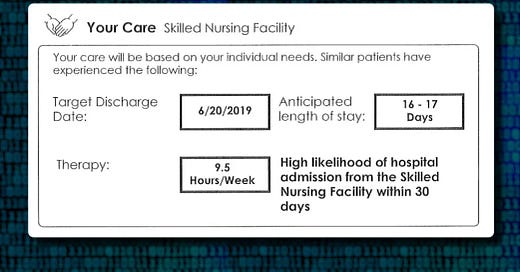Getting to grips with ... nH Predict
A regular look at a prominent AI or algorithmic system, model or dataset
The yins and yangs of UnitedHealth’s nH Predict post-acute care system
Source: UnitedHealth Group
nH Predict is a software system that predicts how much post-acute care a patient should need, including when they should be discharged from hospital.
It does this by sifting through millions of medical records to match patients with similar diagnoses and characteristics, including age, gender, living situation, preexisting health conditions and other factors.
Based on these comparisons, the algorithm anticipates what kind of care a specific patient will need and for how long.
The system was first developed by US-based health technology company NaviHealth. NaviHeath was acquired by UnitedHealth Group in 2020.
The yang: nH Predict is seen to help heathcare providers and patients in a number of ways, notably:
Accuracy. The algorithm is designed to analyse vast amounts of patient data, including demographics and health records, to assist healthcare providers in making informed decisions. By correlating individual patient data with broader datasets, NH Predict aims to improve the accuracy of clinical assessments and treatment recommendations.
Efficiency. NH Predict automates a significant portion of administrative work, potentially reducing human labor by 50–75 percent in tasks related to patient data analysis and decision-making processes. This efficiency can free up healthcare professionals to focus on direct patient care rather than paperwork.
Cost. Implementing NH Predict may lead to cost savings for healthcare systems by minimising unnecessary tests and treatments through better-targeted care recommendations. This can also alleviate financial burdens on patients and insurers alike.
The yin: nH Predict has raised significant concerns regarding how it is used and its impact on patients and the US healthcare system:
Inaccuracy. Reports indicate that the NH Predict algorithm has a 90 percent error rate, leading to inaccurate predictions about patient care needs. This high level of inaccuracy can result in patients receiving inadequate care or being prematurely discharged from medical facilities.
Automation bias. Clinicians have reported instances where decisions made by the algorithm contradict and overrride their professional assessments, potentially compromising patient safety.
Coverage denials. The algorithm has been implicated as algorithmic cover in the premature termination of payments for necessary medical treatment, particularly for elderly and disabled patients. This can force patients to pay out-of-pocket for care that should be covered by insurance.
Discrimination and health inequities. The algorithm may perpetuate or exacerbate existing health disparities, particularly among marginalised groups. By not fully considering social determinants of health or individual patient circumstances, NH Predict risks making biased decisions that disproportionately affect vulnerable populations.
Psychological impacts on patients. The uncertainty and stress caused by unexpected coverage denials can have a significant psychological toll on patients and their families, particularly when they are already dealing with serious health issues.
In summary, while NH Predict aims to streamline post-acute care management, its implementation appears to have resulted in a range of serious harms that affect patient care quality, equity and rights, leave deep mental scars, and potentially erode trust in the US healthcare system.
Incidents associated with nH Predict:



